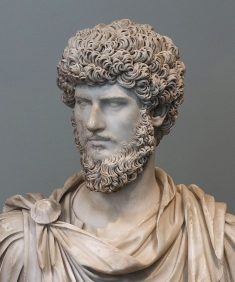Lucius Aurelius Verus was born in December, 130 in Rome to Lucius Aelius Caesar and Avidia Plautia. Verus was the eldest child, with two sisters and a brother. Hadrian’s first choice as heir to his throne was Aelius, but he died in 138. Hadrian consequently named Antoninus Pius as his heir. Antoninus Pius would later adopt Verus as his son, along with Marcus Aurelius, and the two would become Pius’ successors.
Early Life
Armed with a good education, Verus ventured into politics at age 23. He started as a quaestor and attained the status of a consul at the age of 24. Verus had much respect for Marcus, and the two seemed to have agreed early on that Marcus would act as the more dominant emperor when they became co-rulers. This was likely due to Marcus’ having had more experience in governance. The Senate had felt the same way and was prepared to declare Marcus as emperor. Marcus, however, refused and stated that he would only accept the title if Verus agreed to be his co-ruler. The Senate’s proclamation of both men as emperors marked the first instance of joint rulership in the empire’s history.
Reign
Verus and Marcus started their reign by handing out a substantial amount of money to each soldier. This move has its roots in the reign of Claudius, and it cuts down on the possibility of any rebellion. In the first year of the joint reign, however, the King of Parthia, Vologades IV, invaded Armenia. Armenia was a vassal state of Rome, and it became clear that the emperors had trouble on their hands. The governor of Cappadocia, Sedatius Severianus, fought the Parthian forces, but his army was defeated.
Following this, Verus and Marcus sent the governor of Britain, Marcus Statius Priscus, to the troubled region. The emperors soon realized the seriousness of the situation and both agreed that Verus should travel to the area and manage the conflict. Verus knew that he lacked military knowledge, so he brought able generals with him. After some months, he arrived at Antioch and started training his forces for combat. With the war supplies full and his men battle-ready, Verus let loose a counter-attack against the Parthians. He recaptured Armenia and, for his victory, was given the title of Armeniacus. He founded a new capital in the region, called Kaine Polis, and assigned a Roman senator as Armenia’s new king.
The Parthians next invaded Osroene in Mesopotamia, another vassal kingdom of Rome. The capital city of Edessa fell to Parthian forces, and so Verus left Armenia to reclaim the region. He succeeded in freeing Edessa, then attacked the Parthian capital of Ctesiphon and burned it down. Verus returned to Rome in 166, where he was honored with the titles of Parthicus Maximus and Medicus.
Death
Verus loved merrymaking, and so, after his accomplishments, he built a tavern in his house and hosted parties for his friends. His partying came to an end in 168, when the Marcomanni tribe invaded the Roman empire on the Danubian border. He and Marcus headed to the region, but Verus fell ill and had to come back to Rome. He died a few days later, believed to be a casualty of the Antonine Plague, which was then ravaging the empire.
Marcus mourned the death of his adopted brother and, after Verus’ funeral, granted him the status of a god.
